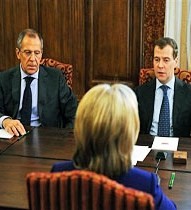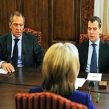
Massive Vote-Rigging Exposed in Russia
Publication: Eurasia Daily Monitor Volume: 6 Issue: 189
By:

U.S. Secretary of State Hillary Clinton traveled to Moscow this week in an effort to promote the “reset” in Russian-American relations, to secure collaboration on Afghanistan, Iran and North Korea, and offer the Kremlin ballistic missile defense cooperation and nuclear arms control agreements. However, for the Russians the most important concession is the apparent agreement by Barack Obama’s administration to tone down criticism of the massive suppression of basic democratic and human rights by the Kremlin. Kommersant quoted Michael McFaul (a senior adviser to Obama who co-chairs a new U.S.-Russia working group on civil society issues with first deputy chief of the Kremlin administration Vladislav Surkov) as saying that the U.S. “will not teach Russia democracy.” The newspaper interpreted this as a major change in U.S. policy (Kommersant, October 13).
The U.S. delegation reacted to the publication by using damage control measures. An unnamed State department official was quoted as saying that Kommersant had misquoted McFaul (AP, October 13). The Western journalists accompanying Clinton extensively covered remarks by the Secretary of State during public appearances about how good it would have been, if human rights were observed in Russia. Speaking to students in Moscow State University Clinton said: “People must be free to take unpopular positions, disagree with conventional wisdom, know they are safe to peacefully challenge accepted practice and authority” (Reuters, October 14). “I think all of these issues –imprisonments, detentions, beatings, and killings– are something that is hurtful to see from the outside,” she told Ekho Moskvy (Ekho Moskvy, October 14).
Clinton met privately with democracy and human rights activists. According to Western reports this “tiny community of liberal democrats” was greatly reassured by her defense of democracy and human rights (AP, October 13). However, Russian journalists quoted the same activists differently. Lev Ponomarev, the head of the Moscow-based group “For Human Rights,” observed: “Her presentation was academic; there was no criticism of the authorities, only regret.” The head of the Memorial Human Rights Center Oleg Orlov noted: “It was an exclusively protocol meeting, there was no concrete discussion of anything” (www.newsru.com October 13).
The Clinton-led team has given an impression in Moscow that human rights and democracy is something the Obama administration would like to leave for the Kremlin to decide on its own. The timing of Clinton’s visit was unfortunate, since it coincided with the announcement of the results of the shamelessly rigged local government elections on October 11, held in 75 regions of Russia. In these elections, opposition candidates were refused registration, while independent observers reported massive vote rigging and ballot box stuffing. There was violence in the Dagestani city of Derbent. Yet, the state-controlled electoral officials declared the elections as free and valid, with Prime Minister Vladimir Putin’s ruling United Russia (ER) winning practically all the disputed seats, bringing Russia closer to a one party state (www.newsru.com October 12).
In Moscow the official results of the city Duma election gave ER 66.26 percent, Communist KPRF 13.27 percent, pro-Kremlin Liberal Democratic Party (LDPR) and Just Russia (SR) – 6.14 percent and 5.34 percent respectively. Liberal Yabloko (that gained more than 10 percent four years ago), secured only 4.7 percent. In the 35 member Moscow Duma ER will have 32 seats and KPRF 3. Exit polls taken by the All-Russian Center for Public Opinion Studies VTsIOM on election day gave totally different figures: EC – 45.5 percent, KPRF –17.7 percent, Yabloko –13.6 percent, SR –8.4 percent (Interfax, October 12). If the elections were not shamelessly rigged, United Russia would still have won a majority, but the Moscow Duma would have been multi-party. It seems that the present corrupt rulers of Russia do not want to even allow the semblance of democracy.
While Clinton was still in Russia, the KPRF, LDPR and SR opposition parties in the State Duma staged a walk out to protest against the rigging of the elections. The party leaders are demanding a meeting with President Dmitry Medvedev and the dismissal of election officials and governors that carried out the massive electoral fraud (RIA Novosti, October 14). This demonstration of defiance is unprecedented in modern Russia. The State Duma under Putin’s regime has been a rubber stamp parliament totally submissive to the Kremlin. LDPR and SR are pro-Kremlin parties, but now they see that if the present massive rigging is repeated during the next national elections, they face political oblivion as the transformation into a one-party state is completed. In a strange coincidence this week the pro-Kremlin LDPR leader Vladimir Zhirinovsky defended democracy in Russia with more passion than Clinton.
McFaul’s interview published by Interfax does not leave an impression that Kommersant grossly misinterpreted his words. McFaul spoke with elation on working with Surkov to promote U.S.-Russian civil society cooperation, about new understandings on Iran, North Korea and Afghanistan. He compared the Obama policy towards Russia with that of Ronald Reagan (Interfax, October 13). Surkov is known in Russia as the prime architect of the suppression of democracy. McFaul told Interfax that he shares the fears of human rights activists in Russia, but only as an individual, not as an official. Reagan was a shrewd politician and a winner. The present Obama policy towards Russia is more reminiscent of the cynical realpolitik of Richard Nixon and Henry Kissinger that eventually ended in failure –as did the Clinton visit (today Kissinger is a friend of Putin).
During Clinton’s visit Foreign Minister Sergei Lavrov insisted that any talk of sanctions against Iran at this stage is counterproductive (RIA Novosti, October 13). At the same time, a U.S. official told reporters that Medvedev expected Iran to implement its promises on its nuclear program and if it did not “there should be sanctions” and that this was “reassuring” (Reuters, October 13). Lavrov in most cases knows better than Medvedev, since the future Russian foreign policy is decided by Putin –whom Clinton did not meet. While giving noncommittal reassurances, Moscow will be waiting to see what other concessions the Obama team may offer.




